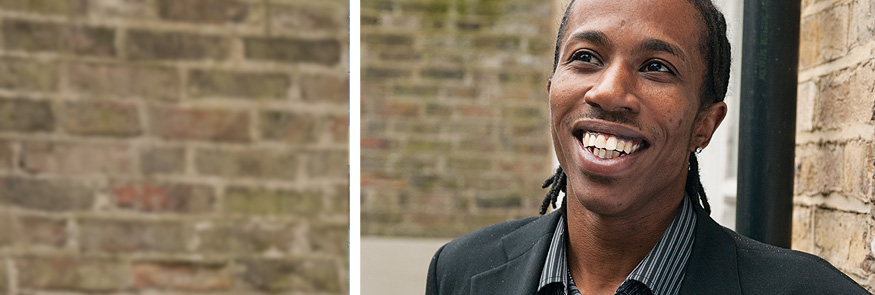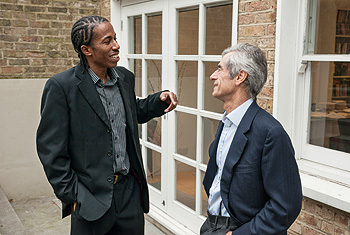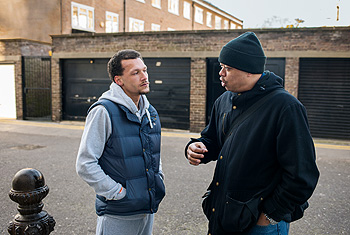Breaking the cycle
Junior Smart and the Southwark Offenders Support Project

It helps to have travelled that road yourself when you’re trying to show others the way. Former criminal Junior Smart is helping young offenders in the UK to regain a foothold in society. The project he launched is succeeding where multiple government initiatives have failed.
by Gavin Knight
LAWRENCE, a wiry professional car thief in his mid-twenties, with an angular face and piercing green eyes, stood outside the towering terracotta amphitheatre of the Royal Albert Hall eyeing up a brand new S-Class Mercedes. The car had an off-road price of £60,000 and Lawrence had built up a long list of criminal associates who would be happy to dispose of it. Minutes later, he swung the Mercedes into Kensington Gore, a four-lane road that skirts the south side of Hyde Park, heading for Knightsbridge, then on to the river. He had made his first mistake: by turning right he had run straight into a demonstration outside the Iranian embassy. Lawrence sat still in a traffic jam. He glanced nervously at the protesters, five deep with green flags and placards as they chanted, punched the air and swarmed over metal railings. It was an interminable 25 minutes before he emerged and accelerated away. Before he even made it to Knightsbridge, the rotor-blades of a police helicopter were thundering above him. Lawrence returned to jail. He had been in and out of prison since he was 17; like most prolific young offenders he just could not break the cycle of crime. They represent the most excluded young men in society; integrating them back into the community remains one of the most difficult challenges we face today. In an age of austerity cuts, the cost of reoffending represents a shocking £11 billion a year.
The cost of exclusion
The urgency of reaching out to this lost generation hit home in August 2011, when disturbing images of five days of street rioting were sent around the world: waves of masked young boys in hoodies looted trainers and mobile phones and set fire to local businesses as broken glass littered the streets. Of the looters who were brought before the courts, two thirds had special educational needs and lived in the most deprived urban areas of the UK. These young men, excluded from society, were processed by the criminal justice system and sent to jail. The failure for Britain was that the country had witnessed the same riots in deprived inner-city areas 30 years ago under Margaret Thatcher. Successive governments had failed to find a solution to the problem: social exclusion had just passed on from father to son.
After three decades of failed policies there is new hope emerging from an enterprising individual: Junior Smart. Junior’s personal journey is one of extraordinary transformation from an isolated delinquent into a natural leader of immense charisma. As a young man, Junior was raised in Southwark, one of the most deprived boroughs of London, and grew up amongst council estates rife with crime, drug use and violence. Junior fell in with a group of friends and drifted into making the wrong choices, a path which led him ultimately to a cell in Crawley Police Station, facing a lengthy sentence for a drug-related offence.
“My first night in custody was absolutely awful,” he recalls. “Gradually through the night, calling my sister, I realized how serious it was. It was such a high-profile case that most of the solicitors they called didn’t turn up, they didn’t want to be involved.”
As he repeatedly reached out to his sister he was filled with deep shame as the full horror of his situation sank in.
“My mother had passed away years before. My sister knew nothing of what I had been doing. I’d been living this dual life: one person to my family, another to my friends.”
He kept pacing his cell, pressing the bell and asking the officers why there was no support for someone like him, a young man of 24 who had never been arrested before. The officer told him he could talk to the Samaritans and slammed the shutter. The next day he was taken to court and sent to High Down Prison for ten years.
“Nothing in this world prepares you for prison. It’s a place of paranoia, fear, victimization.”
“Nothing in this world prepares you for prison,” Junior says with genuine feeling. “Despite what the media say about prison being easy and a hotel, it’s nothing of the sort. You can touch the toilet bowl from your bed; you’re in a room with three other men.”
His friends, who had told him he was “untouchable”, never visited him. He was utterly alone.
“It’s really tough. It’s a place of paranoia, fear, victimization. Bullying was rife. Drugs were rife.” Junior was determined not to be a victim, but to be an agent for change. He sought out a group of prisoners trained by the Samaritans, called The Listeners. He persuaded them to let him join them by promising that he would continue to help offenders after his release. As a trained Listener he began to offer support to other offenders.
“It is always heart-wrenching when you get to know someone in that environment, because they rarely open up to anyone,” he explains.
He was dismayed when his cell-mate Ricky, imprisoned for burglary, returned soon after his release for a different offence of drug-dealing. Ricky explained that he’d committed the original burglary to fund his addiction. Junior was determined to understand, through people like Ricky, why the prison system was failing so badly.
Revolving doors
Equipped with innate leadership skills, Junior decided to address full-on a problem that no government had been able to crack: the re-offending rate amongst the young. He was driven to turn his own sentence on its head, and use it not just to rehabilitate himself, but also to learn. The more he studied and mentored other offenders, the deeper the insight he gained. Three quarters of young offenders returned to custody: it was revolving doors. Some were turning to firearms. The cost to society was immense, not least the £75,000 a year it costs to keep one person in prison. Junior put his ideas into practice and discovered the most effective approach was to offer young offenders tailor-made support both while they were in custody and after their release. “What for me was really heart-breaking was that none of the people around me had any skills,” Junior says. “For some guys it was their fifth, sixth time in custody. Some of them, though, had real prospects; they were just going about it in the wrong way.”
To tackle the young offenders’ lack of skills, Junior adapted each programme to their individual needs. He aimed to raise their aspirations: one client was content just working as a labourer for £10 an hour, but Junior pushed him to be more ambitious. He encouraged him to study part-time, doing plastering, wallpapering and carpentry, working on the weekends to supplement the courses; the client started laminating the floors of local tenants until, at 25, his end-goal became to run his own business.
Junior’s drive and commitment remained undimmed after his release and five years ago he set up the Southwark Offenders Support (SOS) Project, which gave young offenders intensive mentoring, as well as help with housing and training, so they could re-enter the labour market. While in prison young offenders survive on £2.50 a week; on release they are given a £47 discharge grant to help them survive for three weeks until state benefit payments begin. The SOS project gives them practical support in accessing that grant.
Junior’s results are impressive: of the 457 clients he works with, only 15 to 20 percent have reoffended. His programme costs only £2,000 per client, compared with £75,000 a year to keep one offender in prison. The SOS Project operates under the umbrella of the respected, award-winning charity St. Giles Trust. Established 50 years ago to prevent the children of offenders from becoming the next generation caught up in the criminal justice system, the St. Giles Trust has built up strong links with potential employers; Junior is able to tap into that employer network.
The power of networking
Junior’s ground-breaking work gained one of the most prestigious stamps of approval when he attracted the attention of Ashoka, an organisation dedicated to the profound transformation of society. Ashoka uses a rigorous search and selection technique to scour the globe for extraordinary individuals with novel ways of addressing social problems. They only commit to ideas that have gained altitude and visibility. In 2008 they selected Junior to become one of their social entrepreneur Fellows. This was an extraordinary honour for Junior. In eight years, through his innate drive and commitment, he had transformed himself from a desolate figure in a prison cell, to being ranked amongst individuals like Jimmy Wales, the founder of Wikipedia or Camila Batmanghelidjh, who started Kids Company.
Despite his own impressive journey, Junior never fails to answer calls from his clients. One of his clients, Darren, would always call Junior at 4 a.m. and on Valentine’s Day. Darren was heavily involved with gangs and was sent to Rochester Prison. Junior helped him to focus on his positive goals and attend a course funded by the Prince’s Trust to develop his interest in music. Now 23, Darren is currently taking a National Vocational Qualification course to help kids turn their lives around and works with the SOS gangs project.

It was in 2010 that John J. Grumbar, then Executive Chairman of Egon Zehnder, got to know the SOS project. After interviewing the founder of Ashoka, Bill Drayton for THE FOCUS, John got involved with the organization and was so impressed with Junior’s programme when they met in early 2010, he urged him to expand it into the borough of Kensington and Chelsea. What intrigued him most was the potential of this approach to be a real “Big Society” role model. Together with Junior he pitched the idea to the police’s Partnership Coordinator for the area, Inspector Dave Evans.
“People think of Kensington and Chelsea as quite an affluent borough but in the North East corner you have one of the most deprived wards in the country, from a council perspective,” Dave explains. “Just across the Harrow Road, in the Mozart Estate, at the end of last year three girls were shot, which regenerated people’s interest in the gang problem.”
Dave knew that the majority of crimes in the borough were committed by a small group of repeat offenders known as Priority Prolific Offenders (PPOs). For the last seven years the police’s strategy with PPOs was to have them mentored by police officers.
“Police officers were engaging with offenders, trying to move them to a more positive lifestyle,” Dave said. “But there’s only so much we can do, because we’re perceived as the ones that have put them there in the first place. They feel anything they say to us could be used against them.”
Credibility that counts
Listening to Junior he realized that ex-offenders, working in partnership with police officers, could be far more effective as they had a far greater level of empathy with the PPOs. By early 2011 Junior’s model was running successfully in the borough: an SOS caseworker, ex-offender Elroy Palmer, was working closely with Constable Michael Spyrou, targeting a small group of PPOs responsible for the majority of crimes in the area.
“They’re not going to listen to me, as a cop,” Michael told me. “What can I say to them to change their lifestyles that’s as significant as Elroy’s experience?”

One of his key challenges was how frequently they made excuses for their re-offending. Michael says that while young offenders can lie to him, a police officer, they can’t fool Elroy. The team achieved excellent results with their client, Lawrence, the prolific car thief who stole the Mercedes from outside the Albert Hall.
Lawrence was stealing bikes at 13, robbing with the threat of violence at 15. In prison he recognized many of the other inmates from his school and neighbourhood. An older criminal taught him how to break into cars. At 21 he was sentenced to six years for robbery. Two months into his sentence his daughter was born and he watched her grow up through the bars. A year after his release, his relationship with the mother broke down; he returned to his old haunts and started using drugs. After he stole the Mercedes he was classified as a Prolific Priority Offender and was introduced to Elroy Palmer on the SOS project.
While young offenders can lie to a police officer, they can’t fool their caseworker.
“At first I thought, who is this guy, what can he do for me?” Lawrence says. Elroy promised help with housing and work, but Lawrence thought it was all a “load of breeze”. Elroy secured him an interview with Timpsons, a key-cutting and shoe repair outfit with 36 shops in London. He prepared Lawrence for typical questions and schooled him in posture and body language. Steadily, Elroy built up Lawrence’s confidence. Lawrence put on a suit for his first job interview. “The last time I wore that suit was when I got six years. My mum said: don’t wear that suit, it’s bad luck.” A police sergeant lent him a tie. The interviewer was a 43 year-old cockney; many of the questions he’d practiced came up. He was offered a two-day trial.
“Smashed the two-day trial. Loved it!” Lawrence grins enthusiastically. He cobbled his first pair of shoes and he was offered a full-time job. Elroy misted up with paternal pride as he gave Lawrence a congratulatory bear hug. Lawrence felt proud to squeeze in next to fellow commuters each morning on the London underground. He’s planning to learn more skills to increase his wages: shoe repairs, computer skills for engraving and dry-cleaning orders. He stays in touch with Elroy and PC Spyrou. His family are happy. His first pay cheque will arrive just in time for his daughter’s sixth birthday. Lawrence is very grateful to the SOS project. “If I wasn’t on this programme, I’d definitely be in prison,” he says.
A scalable model
Junior’s aim is to expand the project into every single London borough and to replicate best practice. John J. Grumbar and a group of local residents have personally subsidized the project in Kensington & Chelsea, with the local police matching their investment; but securing funding in other boroughs is crucial to its expansion. John believes it is a scalable model because Junior’s idea is so simple. “The simple idea that Ashoka spotted in Junior was that ex-offenders are the best at influencing people coming out of prison. Members of SOS can demonstrate that they themselves have made it and many of the people they mentor have made it, in terms of finding a proper life and re-engaging with society. After five years and 400 case studies, they have a tremendous track record of credibility.”
Another reason why this is a scalable model is that it has the backing of the St. Giles Trust, which has a reservoir of ex-offenders who they are training up. When the SOS model is replicated in a new borough, like Kensington and Chelsea, Junior’s team engage with a small number of the toughest offenders using their focussed technique of intensive mentoring. If they manage to influence half of the PPOs in the borough, this has a remarkable trickle-down effect to the other offenders in the area. The police and probationary services recognize that the SOS team can connect with this target group far more effectively than the state bodies have done to date. In the short term at least, another vital part of the scheme’s success is Junior’s personality and drive as an instrument of inclusion. “Here is a guy with great charisma, great natural leadership skills, who is addressing a problem that no one else has managed to address successfully,” John says. Although Junior has now achieved the status of a strong, magnetic leader overseeing a growing workforce, he always remembers that his amazing journey began with that first night as a frightened young criminal facing the full horror of prison. “I am fortunate in that I am able to go back into prisons,” Junior says, “so I’m never able to forget who I am and where I’ve come from.”
To learn more, visit the SOS Project website.
Gavin Knight
is the author of Hood Rat, a non-fiction book about inner-city crime in Britain, based on two years’ research with frontline police units and young criminals in London, Manchester and Glasgow.
PHOTOS: ZED NELSON





